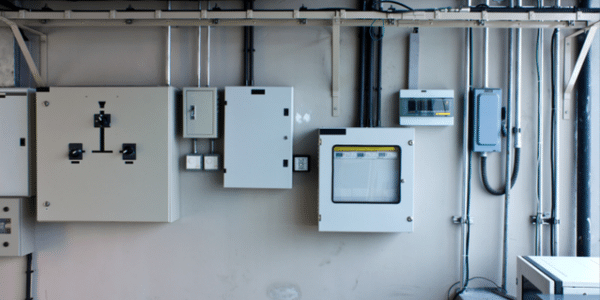Exploring the Corrosion Resistance Properties of Electrical Fiberglass Boxes
6/11/20244 min read


Introduction to Electrical Fiberglass Boxes
Electrical fiberglass boxes are specialized enclosures designed to house and protect electrical and telecommunication components. These boxes are widely used in various industries due to their robust construction and ability to safeguard sensitive equipment from environmental factors. Typically, these enclosures are crafted from fiberglass, a composite material known for its strength, durability, and resistance to various environmental stresses.
Fiberglass is composed of fine fibers of glass woven together and bonded with a resin matrix, resulting in a lightweight yet incredibly strong material. This composition not only offers high mechanical strength but also provides excellent resistance to a wide range of environmental conditions, including moisture, chemicals, and UV radiation. Consequently, electrical fiberglass boxes are ideal for use in harsh environments where traditional metal or plastic enclosures might fail.
The primary application of electrical fiberglass boxes lies in protecting electrical circuits and components from external elements. These enclosures are commonly used in outdoor settings, such as telecommunications infrastructure, industrial automation systems, and utility installations. By effectively shielding critical electrical components, fiberglass boxes prevent damage caused by rain, dust, extreme temperatures, and other environmental hazards, ensuring the longevity and reliability of the housed equipment.
The importance of using durable and reliable enclosures cannot be overstated. Electrical systems are often subjected to harsh conditions that can compromise their functionality and safety. Therefore, selecting the right enclosure material is crucial. Fiberglass, with its superior corrosion resistance, stands out as an excellent choice for these applications. This property significantly extends the lifespan of the enclosures and the components within, reducing maintenance costs and enhancing overall system reliability.
As we delve deeper into the corrosion resistance properties of electrical fiberglass boxes, it becomes evident that their use is not merely advantageous but essential in maintaining the integrity and performance of electrical systems in demanding environments.
Understanding Corrosion and Its Impact on Electrical Enclosures
Corrosion is a natural process that gradually deteriorates materials, particularly metals, due to chemical reactions with environmental elements. This degradation occurs when metals are exposed to moisture, chemicals, and environmental pollutants, leading to the formation of oxides or other compounds that weaken the material. Corrosion is a significant concern for electrical enclosures as it can compromise their integrity and functionality.
In the context of electrical enclosures, corrosion can manifest in various forms, including rust on steel components, pitting on aluminum surfaces, and tarnishing of copper elements. The primary causes of corrosion in these settings include prolonged exposure to water, salt, industrial chemicals, and pollutants present in the atmosphere. These factors accelerate the corrosion process, leading to potential failures in electrical systems.
Corrosion resistance is paramount for electrical enclosures because it directly impacts the reliability and safety of the equipment housed within. Corroded enclosures can result in equipment failure, posing severe safety hazards such as electrical shorts, fires, and even explosions. Additionally, corrosion can lead to increased maintenance costs due to the frequent need for repairs or replacements of compromised components.
Electrical fiberglass boxes, known for their superior corrosion resistance, are often utilized in environments where traditional metal enclosures would be vulnerable. For example, industrial settings with high levels of chemical exposure, coastal areas with salty air, and underground installations prone to moisture are common environments where corrosion-resistant electrical enclosures are essential. These fiberglass boxes provide a durable and reliable solution, ensuring the longevity and safety of the electrical systems they protect.
By understanding the causes and impacts of corrosion on electrical enclosures, it becomes clear why materials like fiberglass are preferred in challenging environments. Their ability to withstand harsh conditions without degrading ensures that electrical systems remain operational and safe, ultimately reducing maintenance costs and enhancing overall system reliability.
Corrosion Resistance Properties of Fiberglass: Benefits and Applications
Fiberglass, a composite material composed of glass fibers embedded in a resin matrix, boasts exceptional corrosion resistance properties, making it an ideal choice for electrical enclosures. One of the primary reasons for its superior performance in harsh environments is its inherent chemical inertness. Fiberglass does not react with most chemicals, including acids, bases, and salts, which significantly reduces the risk of degradation and ensures longevity.
The physical characteristics of fiberglass also contribute to its durability. The material's non-porous surface prevents moisture penetration, thus eliminating a common cause of corrosion seen in metals. Additionally, fiberglass is resistant to UV radiation, which can cause degradation in many plastic materials over time. Unlike metal, which can rust, or plastic, which can become brittle, fiberglass remains stable and retains its structural integrity in a wide range of environmental conditions.
When compared to traditional materials like metal and plastic, fiberglass stands out in several key areas. Metal enclosures, while strong, are susceptible to rust and corrosion, especially in coastal or industrial environments where exposure to saltwater and chemicals is prevalent. Plastic enclosures, on the other hand, may be more resistant to corrosion than metal but often lack the strength and UV resistance of fiberglass, leading to potential brittleness and failure under prolonged exposure to the elements.
Real-world examples underscore the advantages of fiberglass electrical boxes. In coastal regions, where salt air accelerates the corrosion of metal enclosures, fiberglass boxes have demonstrated superior performance and longevity. Industrial facilities, where exposure to chemicals is a constant, have also seen significant benefits from using fiberglass enclosures, reporting lower maintenance costs and higher reliability.
Over the long term, the use of fiberglass electrical boxes translates to reduced maintenance costs, improved reliability, and enhanced safety of electrical systems. These benefits not only contribute to operational efficiency but also provide peace of mind, ensuring that critical electrical infrastructure remains protected and functional in even the most challenging environments.
